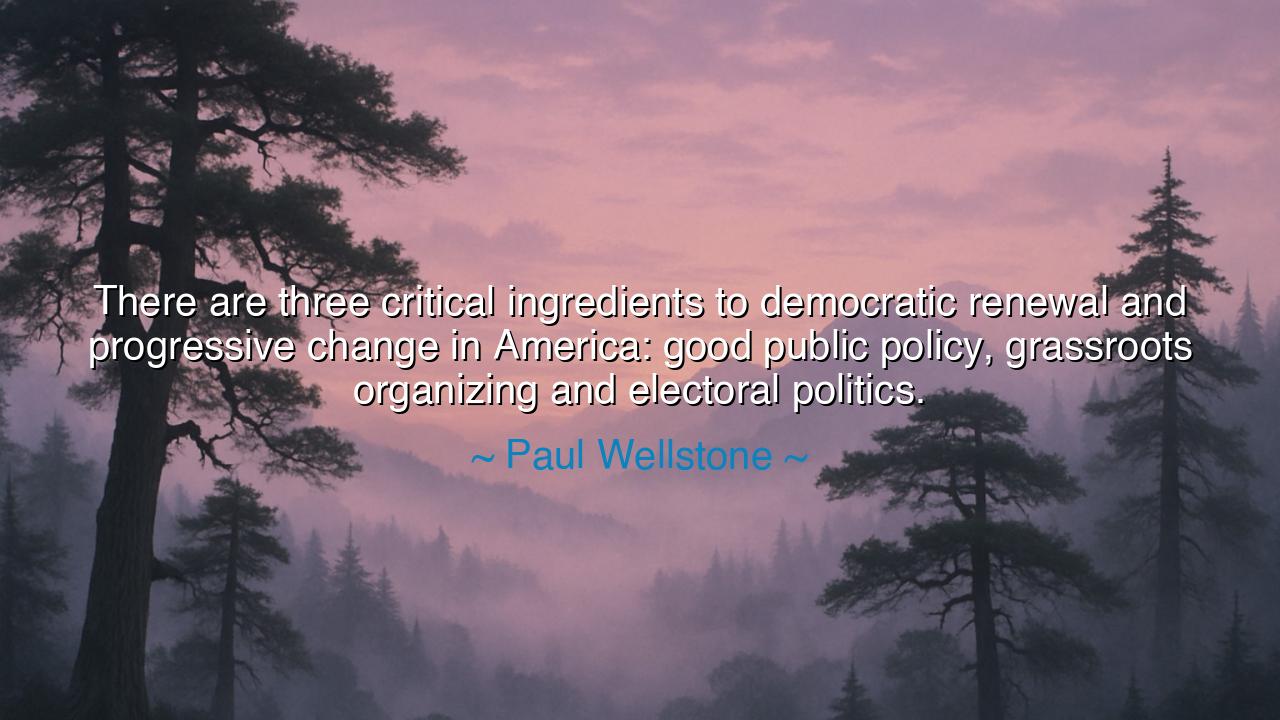
There are three critical ingredients to democratic renewal and
There are three critical ingredients to democratic renewal and progressive change in America: good public policy, grassroots organizing and electoral politics.






Paul Wellstone’s words ring with the cadence of ancient wisdom, for they speak of the eternal struggle between power and the people. He teaches that the lifeblood of democratic renewal is not one thing alone, but a trinity of strength: good public policy, grassroots organizing, and electoral politics. Each stands like a pillar; remove one, and the temple of freedom begins to crumble. With law alone, the people are voiceless; with organizing alone, they are directionless; with politics alone, they are fleeting as the wind. Only together do they create lasting change.
Consider the first pillar: good public policy. This is the wisdom of the state, the codified will of the people. Without just laws, freedom becomes illusion, and the strong devour the weak. When Franklin D. Roosevelt gave birth to the New Deal, it was more than words on parchment—it was the crafting of bridges, the building of jobs, and the lifting of millions from despair. Policy, when aligned with justice, does not merely govern; it heals and gives life.
Yet law alone is barren without the fire of the people. Thus comes the second pillar: grassroots organizing. Here lies the voice of the multitude, not in silence but in chorus. Remember the Civil Rights Movement: ordinary men and women in Montgomery, Selma, and beyond. With their marches, their sit-ins, their cries for dignity, they transformed the soil of America. From the ground rose voices too numerous to ignore, and these voices pressed the rulers to bend the law toward justice.
And then, the third pillar: electoral politics. For in a democracy, the ballot is the spear and shield of the people. Without it, policy can be reversed, and organizing silenced. Consider how women, after decades of struggle, claimed the right to vote in 1920. Their triumph at the ballot box ensured that their voices would echo not merely in protest but in governance itself. Through elections, power shifts hands, and the destiny of a people is carved anew.
Thus, Wellstone’s teaching is clear: change cannot be won by one path alone. It is the harmony of policy, organizing, and politics that births transformation. This trinity is no passing strategy, but a lesson carved into the stone of history: if a people wish to renew their democracy, they must hold fast to all three, lest freedom falter and fade into dust.






HLHai Le
Paul Wellstone’s quote brings up a powerful point about the need for collaboration between policy, grassroots efforts, and electoral politics. But what happens when these elements conflict? If grassroots movements push for one thing, but electoral politics demands something else, how do we reconcile those differences? Is there room for compromise, or is true progressive change about pushing hard for the policies we want and forcing the system to adapt?
HLNguyen Ha Linh
Wellstone’s formula for progressive change seems solid, but there’s one thing that stands out: how do we address the growing disenchantment with electoral politics? In a time when so many people feel disconnected from the political process, how do we reignite faith in the system to push meaningful public policy forward? Can grassroots organizing make electoral politics more accountable, or are we just spinning our wheels without larger structural reforms?
NNNguyen Ngan
I find Wellstone’s formula for democratic renewal compelling, but I wonder if public policy alone can drive the necessary change if there’s no widespread political will or mobilization behind it. Can good policy succeed without strong grassroots support to hold leaders accountable and ensure implementation? Is the electoral process even effective if people feel disengaged or cynical about their votes mattering? What kind of public awareness campaigns can help strengthen the connection between these three ingredients?
NLNgoc Lee
Wellstone’s statement highlights three essential components, but I question whether they are truly enough to drive progressive change in today’s political climate. Are these ingredients being used effectively, or has the political system become so entrenched that real, lasting change is difficult? How do we prevent good public policy from being watered down or ignored once it hits the political machinery? What role does public accountability play in making these elements successful?
LPLy Pham
I appreciate Wellstone’s emphasis on grassroots organizing as part of democratic renewal. But in today’s world, with such deep political polarization, how can grassroots movements bridge the gap between different ideologies? Are we at a point where these movements can truly build consensus, or are we too divided to move forward in a unified way? What strategies can be used to make grassroots efforts more effective in reaching diverse communities?